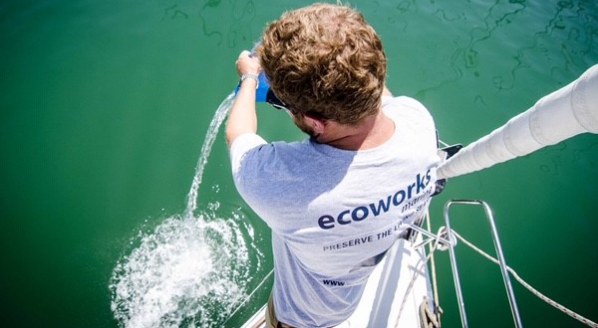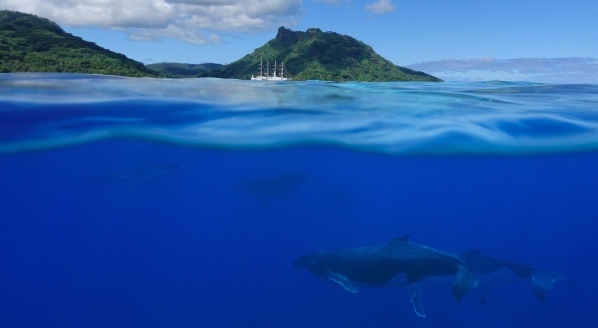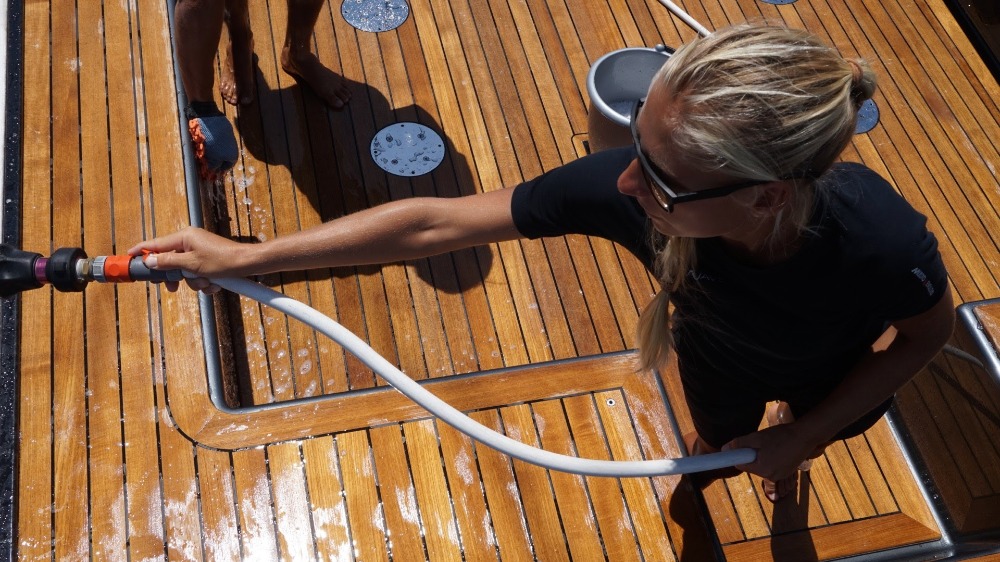Cleaning products affect crew, not just the planet
Ecoworks Marine's Fraser Johnston explains how ingredients in regular cleaning products are harmful to crew…
Cleaning and cleaning products are a major part of everyday life, and this is truer than ever post COVID-19 when cleaning requirements to stay safe will be even more vigorous. However, shocking research that studied more than 6,000 people over a 20 year period indicated that bleach-based cleaning products can be as damaging to the lungs as smoking a pack of cigarettes every day.
Cleaning on board is only going to increase in the new post COVID-19 world, especially on charter yachts. We are already aware that cleaning tasks are often associated with exposure to numerous chemical agents, with potential harmful effects to the respiratory system and, worryingly, individuals can be exposed in several different locations throughout the day. This means that crewmembers regularly cleaning boats, accommodation and kit using traditional cleaning products are in danger of encountering a range of health problems.
Understanding product labels, Safety Data Sheets (SDS’s) or Marine Safety Data Sheets and what the key raw materials are within a product is key to improving the understanding the products you and your team are using, allowing you to better avoid some of the most common, yet damaging, ingredients.
We have a watch list of raw materials that should avoided, and below are some of the likely culprits that are used and should be watched out for. The below is just a selection of the more common ingredients that can be harmful in regular cleaning products – unfortunately there are more:
• 2-Butoxyethanol: A common ingredient in kitchen, window, and multipurpose cleaners that can interfere with the health of your red blood cells;
• Ammonia: Found in glass and bathroom cleaners, ammonia can be very irritating to the eyes, skin, throat, and lungs;
• Chlorine Bleach: A potent antimicrobial and respiratory irritant, bleach is a major ingredient in mildew removers, toilet bowl cleaners, and scouring powders;
• Sodium Hydroxide: A known mucous membrane irritant, this is used in many oven cleaners and drain openers;
• Fragrance: Although the term ‘fragrance’ sounds innocent enough, it can refer to any one of thousands of chemicals linked to skin, kidney, respiratory, and cellular issues;
• Parabens: These antimicrobial, chemical preservatives are associated with negative effects in breasts, hormones, and reproductive areas;
• Phthalates: Commonly found in a host of cleaning products including dish soaps, detergents, and shampoo, phthalates have been shown to negatively impact respiratory health and reproductive function, as well as cause DNA damage;
• Quaternary Ammonium Compounds (QUATS): Found in antibacterial cleaners, fabric softeners, and dryer sheets. Several studies identify QUATS as the cause of respiratory issues in cleaning workers;
• Volatile Organic Compounds (VOCs): Don’t let the word ‘organic’ fool you! Inhaling these gases, which are frequently used in products including household cleaners, disinfectants and air fresheners, can cause eye, liver, nervous system, respiratory tract, and skin troubles—as well as GI discomfort and challenges with equilibrium.
The expectations of yacht owners to keep yachts looking their best and the requirements for charter vessels and others to be deep cleaned between guest trips are important to recognise and respond to. Certain cleaning products on the market, such as Ecoworks Marine’s range of interior, exterior and engineering products, can meet all these expectations without the negative impacts on the environment and users associated with traditional cleaning products.
Using natural ingredients with specialised properties that mean they are able to treat dirt and grime at the source – often in hard to reach places that traditional cleaning can’t. Unlike traditional cleaning products, which often simply displace dirt or bacteria, biotech-based products completely break it down. This in turn helps remove bad odours.
So, a move to more user- and environmentally-friendly cleaning products can easily be justified by the potential to increase cleanliness while saving money, while also reducing the risk to cleaning staff and the environment.
Profile links
Ecoworks Marine Preserve The Living Seas Ltd
NEW: Sign up for SuperyachtNewsweek!
Get the latest weekly news, in-depth reports, intelligence, and strategic insights, delivered directly from The Superyacht Group's editors and market analysts.
Stay at the forefront of the superyacht industry with SuperyachtNewsweek
Click here to become part of The Superyacht Group community, and join us in our mission to make this industry accessible to all, and prosperous for the long-term. We are offering access to the superyacht industry’s most comprehensive and longstanding archive of business-critical information, as well as a comprehensive, real-time superyacht fleet database, for just £10 per month, because we are One Industry with One Mission. Sign up here.
Related news

SuperyachtNews COVID-19 Advisory - ocean preservation
Ecoworks Marine's Fraser Johnston on how the pandemic can trigger time for reflection on crises of another kind
Crew

Controlling underwater noise
SILENT class notations from DNV GL are designed to address growing levels of noise from operations at sea
Owner

New technology reduces noise generated by propeller cavitation
PressurePores mitigates a vessel’s environmental impact by strategically placing holes in the tips of propellers
Technology


Teakdecking Systems partners with The Nature Conservancy
The partnership will work towards improving forestry practices and fighting illegal logging in Myanmar
Technology
NEW: Sign up for
SuperyachtNewsweek!
Get the latest weekly news, in-depth reports, intelligence, and strategic insights, delivered directly from The Superyacht Group's editors and market analysts.
Stay at the forefront of the superyacht industry with SuperyachtNewsweek




